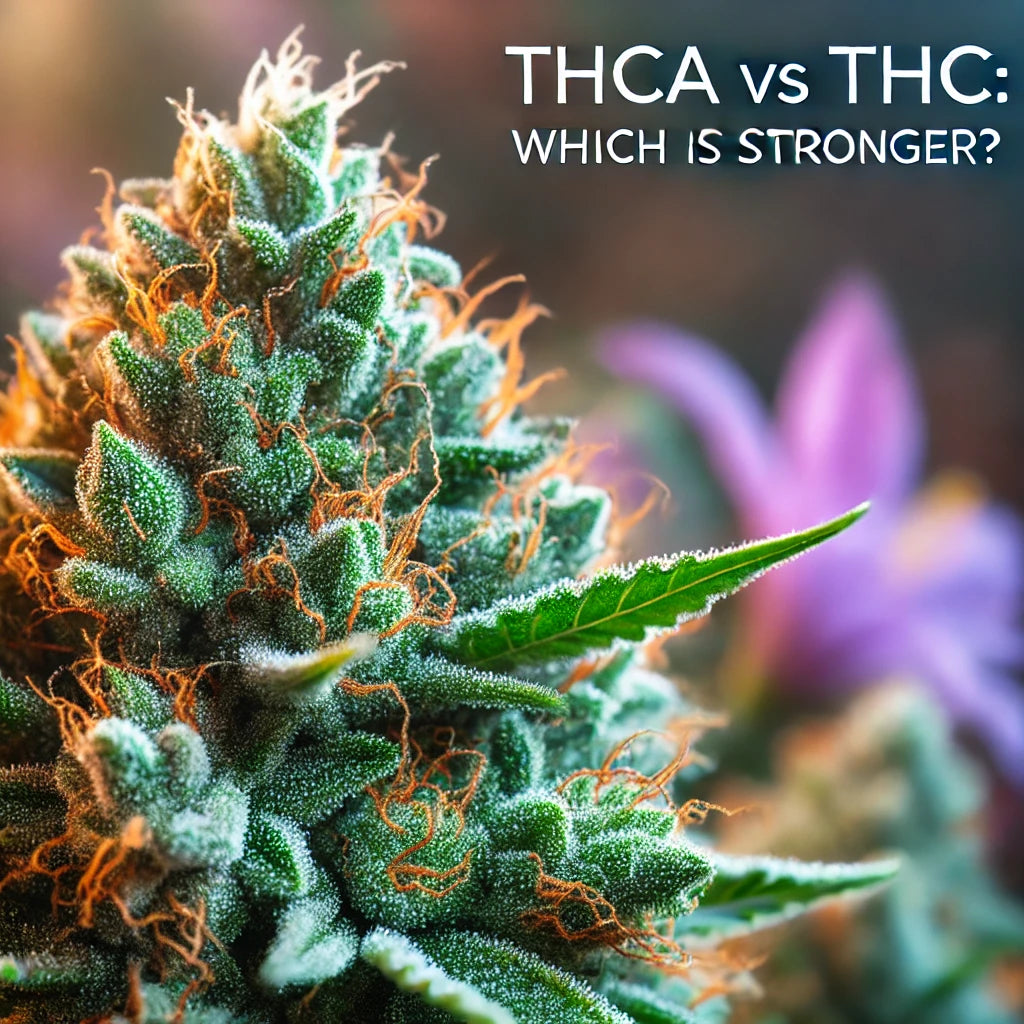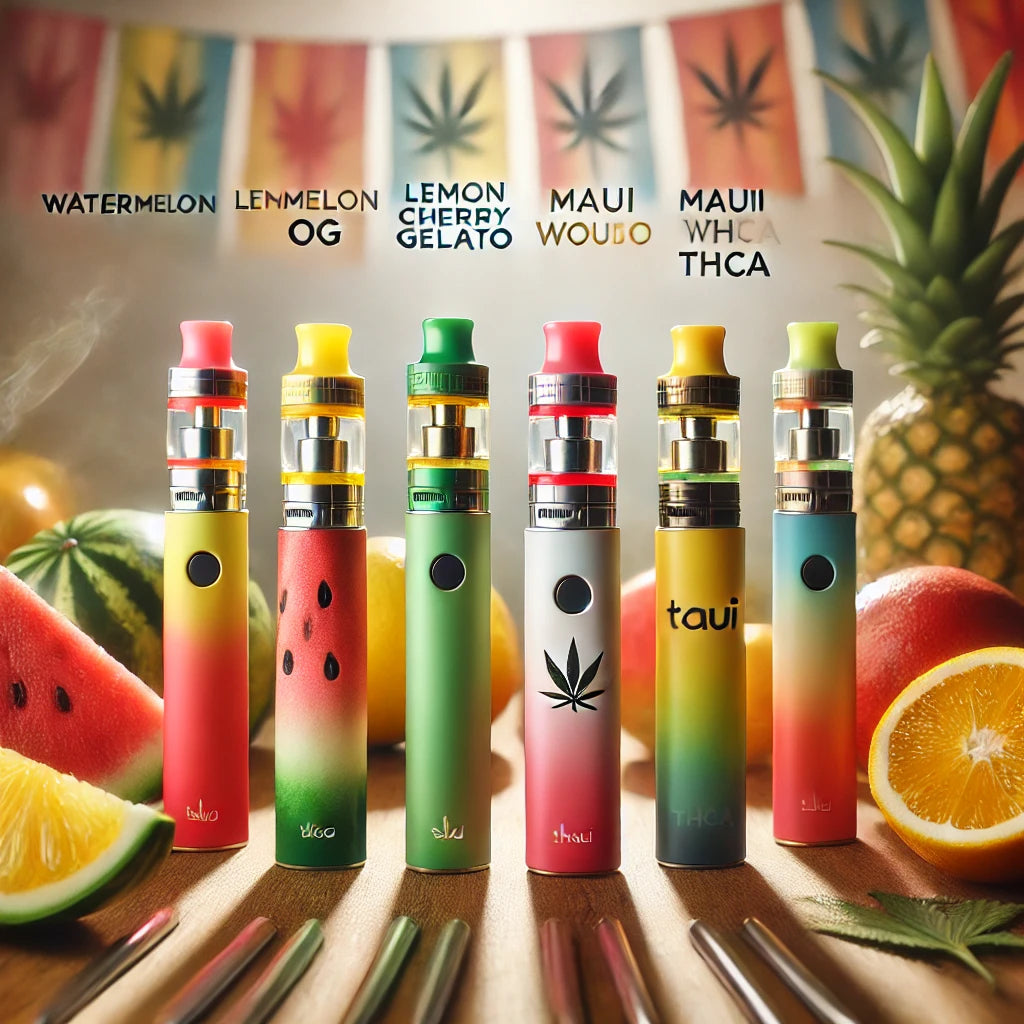Discover the best disposable vapes that provide convenience, flavor, and high-quality THCa experiences. Featuring top picks from Seedless.

THCa and THC Overview
Cannabis is a complex plant filled with various compounds, known as cannabinoids, that each have unique effects on the human body. Two of the most notable cannabinoids are THCa (tetrahydrocannabinolic acid) and THC (tetrahydrocannabinol). THC is well-known for its psychoactive effects, which produce the “high” often associated with cannabis. On the other hand, THCa is the precursor to THC, found in raw, unheated cannabis.
When it comes to comparing the two, many people wonder which one is stronger—THCa or THC. This guide will break down their potency, effects, and how they interact with the body, helping you understand their differences.
What Makes a Cannabinoid Strong?
Before diving into which cannabinoid is stronger, it’s essential to understand what "strength" means in the context of cannabis. When people refer to a cannabinoid as being "stronger," they are typically talking about its ability to produce effects—either psychoactive or therapeutic. Factors that influence the strength of a cannabinoid include:
- Psychoactivity: How much the compound affects the brain and mental state.
- Potency: The concentration of the compound in the cannabis product.
- Bioavailability: How well the body absorbs and processes the compound.
- Duration: How long the effects of the cannabinoid last.
In the case of THCa vs THC, the discussion revolves around their psychoactive potency and overall effects.
THCa vs THC: Potency and Effects
One of the key differences between THCa and THC is that THCa is non-psychoactive, while THC is psychoactive. This means that THCa, in its raw form, will not produce the “high” that THC is known for. However, when THCa is exposed to heat through a process called decarboxylation, it converts to THC, which is where the psychoactive effects come in.
THCa Effects:
- Non-psychoactive
- May help with inflammation, pain, and nausea
- Considered more therapeutic for those who don’t want to experience intoxication
- Commonly consumed raw or in cold-pressed cannabis juices or tinctures
THC Effects:
- Psychoactive (produces a "high")
- Known for its euphoric, relaxing, or stimulating effects
- Often used for pain relief, anxiety reduction, and appetite stimulation
- Commonly consumed through smoking, vaping, or edibles
In terms of psychoactivity, THC is much stronger because it directly affects the brain’s receptors responsible for mood, cognition, and perception. THCa, however, offers therapeutic benefits without affecting mental clarity or producing intoxication.
How THCa Converts to THC: The Decarboxylation Process
The transformation of THCa into THC happens through a process called decarboxylation, which occurs when cannabis is heated. Decarboxylation removes a carboxyl group from the THCa molecule, turning it into THC.
Here’s a simplified version of how it works:
- Raw Cannabis Contains THCa: In freshly harvested cannabis, THCa is present in large amounts.
- Heat Causes Decarboxylation: When cannabis is exposed to heat (smoking, vaping, or cooking), THCa loses its carboxyl group, converting to THC.
- THC Becomes Psychoactive: Once THCa is converted to THC, it can bind to CB1 receptors in the brain, producing the familiar high associated with cannabis.
Medical and Therapeutic Uses of THCa and THC
Both THCa and THC have potential medical applications, but they differ significantly in how they are used.
THCa:
THCa is gaining attention for its potential therapeutic benefits without the psychoactive effects. Here are some common uses of THCa:
- Anti-inflammatory: THCa may help reduce inflammation, making it useful for conditions like arthritis.
- Neuroprotective: THCa shows promise in protecting brain cells, which could be helpful for people with neurodegenerative diseases like Alzheimer’s and Parkinson’s.
- Anti-nausea: THCa may help with nausea and stimulate appetite, especially for people undergoing chemotherapy.
- Antioxidant: It’s believed that THCa has antioxidant properties, which could contribute to overall health.
THC:
THC is well-known for its medicinal benefits, particularly in managing pain, mood disorders, and appetite loss. Here are some therapeutic uses of THC:
- Pain relief: THC is commonly used to treat chronic pain, including pain from conditions like fibromyalgia and multiple sclerosis.
- Appetite stimulation: THC is effective at increasing appetite, making it a useful treatment for people experiencing appetite loss from illnesses or medications.
- Anxiety and depression: While THC can help with mood disorders, high doses can sometimes increase anxiety in sensitive individuals.
- Sleep aid: Many people use THC to help them relax and fall asleep, especially those dealing with insomnia or sleep disturbances.
Which is Stronger: THCa or THC?
When it comes to psychoactivity, THC is undeniably stronger because it directly interacts with the brain’s CB1 receptors, producing the euphoric and mind-altering effects associated with cannabis. In contrast, THCa is non-psychoactive, meaning it doesn’t create any intoxicating effects when consumed in its raw form.
However, THCa can become just as strong as THC when it is heated and converted into THC through decarboxylation. So, the strength of THCa depends on whether it has been activated through heat or consumed raw.
In terms of therapeutic potency, THCa may be considered stronger for individuals seeking anti-inflammatory, neuroprotective, and nausea-relief effects without the psychoactive impact of THC. On the other hand, THC is favored for its ability to provide immediate relief for pain, anxiety, and appetite stimulation, alongside its euphoric effects.
Frequently Asked Questions About THCa and THC Strength
-
Q: Does THCa get you high?
A: No, THCa does not produce psychoactive effects in its raw form. It only becomes intoxicating when it is heated and converted into THC. -
Q: Which is stronger, THCa or THC?
A: THC is stronger in terms of psychoactive potency. However, THCa is considered potent for its therapeutic benefits without causing intoxication. -
Q: How do you consume THCa?
A: THCa can be consumed raw in juices, smoothies, or tinctures. It’s important to avoid heating it to keep it in its non-psychoactive form. -
Q: Can you use THCa for medical purposes?
A: Yes, THCa has potential therapeutic benefits, including anti-inflammatory and neuroprotective properties. It may be helpful for people who want the benefits of cannabis without the high. -
Q: How long does it take for THCa to convert to THC?
A: The conversion of THCa to THC happens almost instantly when exposed to high heat, such as during smoking, vaping, or cooking cannabis.
